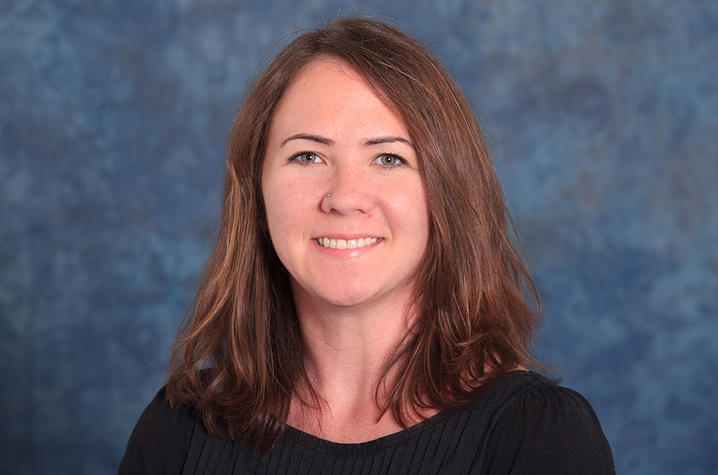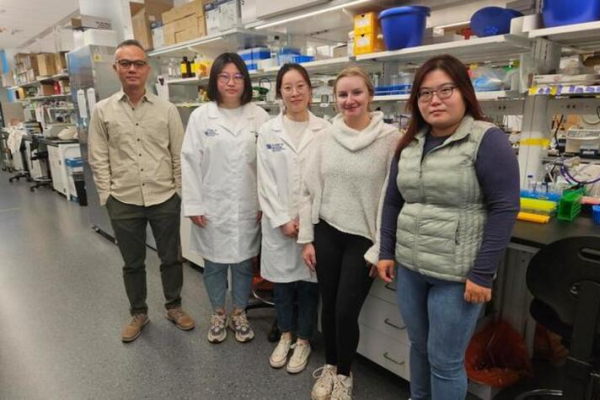Chemistry's Susan Odom Named 2020 'Rising Star'

Susan Odom, an assistant professor of chemistry in the University of Kentucky College of Arts and Sciences, is the recipient of the Women Chemists Committee's (WCC) "Rising Star" award. Odom is one of only 10 scientists to receive this honor.
Rising Star awards are given to women scientists approaching mid-level careers across all areas, including academic, industrial, government and nonprofit, who demonstrate dedication and promise in their prospective fields.
"I am proud to be a part of a lineage of amazing chemists who I admire, including the chemists who nominated me for this award: Jodie Lutkenhaus at Texas A&M University and Jeffrey Moore at the University of Illinois," Odom said. "Both have served as mentors and provided inspiration throughout my career, with Professor Moore serving as my postdoctoral advisor and Professor Lutkenhaus as a current collaborator."
Odom was an undergraduate researcher at UK, where she studied under C.W. Hammond Professor of Chemistry John Anthony. After earning a doctoral degree from Georgia Institute of Technology in 2008, Odom worked as a postdoctoral fellow at the University of Illinois at Urbana-Champaign during which she secured a joint appointment at Argonne National Laboratory as a visiting scientist.
In 2011, she chose to return to UK because of the variety of research being conducted in the College of Arts and Sciences, College of Engineering and Center for Applied Energy Research (CAER). It was here, and through those collaborations, where Odom created new organic compounds for applications in electrochemical energy storage systems. Applications include lithium-ion batteries, which are utilized in portable consumer electronic devices. Her additives have been demonstrated to protect these batteries from overcharging conditions longer than any other electrolyte additive reported to date.
"A major reason that we don't have more energy storage systems is due to economics; batteries are simply not cheap enough to motivate consumers and industries to install storage systems, as opposed to relying on fossil fuels," Odom said. "We must develop low cost energy storage systems, which is the focus of my research group. We use our skills as organic chemists to modify carbon-containing materials to serve in battery systems, both in lithium-ion and redox flow batteries, to increase lifetimes, improve performance and decrease costs."
Odom's patented materials are already commercially available and are being widely studied by researchers all over the U.S.
"We not only want to contribute to lasting knowledge in the chemical sciences, but to make a significant societal and economic impact, and hope that the difference we are seeing in lab-scale performance compared to previous materials will be realized in commercial batteries."
Odom says she is grateful to have found female professors who served as role models and guided her to accomplish her research and educational goals as she navigated a male-dominated field, where less than a third of those pursuing advanced degrees are women.
"We need to fix the problems that are discouraging women from obtaining advanced degrees and entering STEM fields. The Women Chemists Committee was created for this purpose," Odom said.
To combat this issue, Odom collaborated with Ellen Crocker to found the Expanding Your Horizons conference at UK, a program for middle school girls in Kentucky to meet female scientists and participate in inquiry-based workshops. The conference was held in 2017, 2018 and 2019, and Odom is currently seeking to secure funding so they may host the conference again in 2021. Furthermore, Odom serves as the organizer of the Faculty Women's Sanity Club and serves on the board of the ACE Women’s Network, both Kentucky-based organizations that support female faculty.
Odom will formally accept her Rising Star award at the American Chemical Society national meeting this March in Philadelphia.
The Women Chemists Committee serves the membership of the American Chemical Society. The committee goal is to attract, retain, develop, promote and advocate for women to positively impact diversity, equity and inclusion in their professions and society. The WCC increases the participation of women in the chemical sciences and related fields, provides women’s career development opportunities, promotes women’s accomplishments, and advocates within the ACS on topics relevant to women in these areas.
Credits
Madison Brown and Jenny Wells-Hosley (Public Relations and Strategic Communications)

